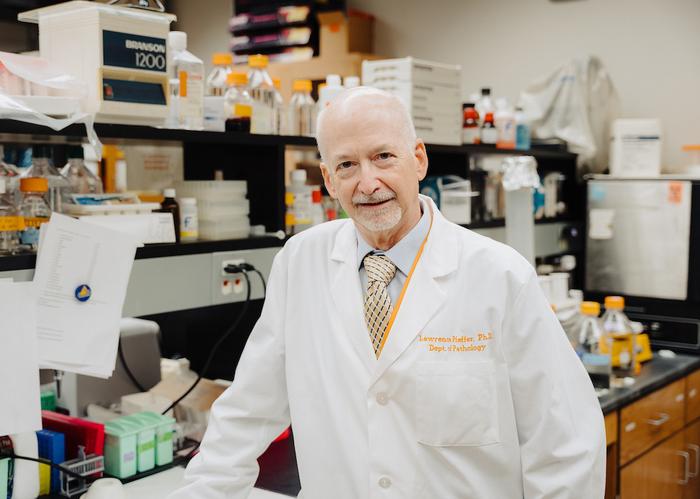Lawrence Pfeffer, PhD, Professor in the Department of Pathology at the University of Tennessee Health Science Center, recently was awarded $2.56 million from the National Cancer Institute over the next five years to identify and target molecular pathways that will enhance glioblastoma’s sensitivity to currently approved drug therapies.

Credit: UTHSC
Lawrence Pfeffer, PhD, Professor in the Department of Pathology at the University of Tennessee Health Science Center, recently was awarded $2.56 million from the National Cancer Institute over the next five years to identify and target molecular pathways that will enhance glioblastoma’s sensitivity to currently approved drug therapies.
Dr. Pfeffer has spent the better part of 20 years trying to improve treatments for glioblastoma, the most common malignancy of the brain and the most lethal. He was drawn to this research after a friend he worked with in New York City in the mid-1980s died from glioblastoma.
“I was an assistant professor at Rockefeller University, and he was an assistant professor at Cornell Medical College,” Dr. Pfeffer said. “In the back of my mind, I always wanted to do something to treat glioblastoma and I’ve been working on this during my career a UT Health Science Center.”
Years ago, Dr. Pfeffer, along with a graduate student in his lab Debolina Ganguly, and his research colleague Duane Miller, PhD, professor emeritus in the Department of Pharmaceutical Sciences in the College of Pharmacy, found a drug that enhances the sensitivity of glioblastoma to temozolomide, the primary therapeutic approach to glioblastoma in patients. “We discovered that if you treat with this drug in the presence of something like temozolomide, it greatly enhanced the ability of temozolomide to kill glioblastoma cells,” Dr. Pfeffer explained.
“Duane and I made new derivatives so that they could be more efficacious in vitro as well as in vivo,” he said. “We discovered some new derivatives of this drug that are very effective and can even take cells that are usually very resistant to temozolomide and overcome that resistance and now make them sensitive.”
“That would be a big deal, because that’s the big problem,” Dr. Pfeffer said. “They’ve tried all kinds of cool, targeted therapies and they just don’t really work in glioblastoma, or they just work for a little while and then just stop working. The way to treat brain cancer patients that works for a while is a combination of temozolomide and radiotherapy. We found that this new drug enhances both the effect of temozolomide and radiation in vitro and we showed that it also increases the effect of temozolomide in an animal model.”
The NCI grant allows for continued research to decrease resistance to treatment in glioblastoma. Use in humans is a long way off.
“What we’re hoping is that we’ll come up with a drug that can be used with currently used therapies and increase their ability to work,” Dr. Pfeffer said. The hope is such a drug candidate might be applicable for other cancers, too.
The mission of the University of Tennessee Health Science Center is transforming lives through collaborative and inclusive education, research, scholarship, clinical care, and public service. With six colleges – Dentistry, Graduate Health Sciences, Health Professions, Medicine, Nursing, and Pharmacy – at its main campus in Memphis, in addition to educational and clinical campuses at major hospitals in Memphis, Knoxville, Chattanooga, and Nashville, and sites across the state, UTHSC strives to fulfill its vision: Healthy Tennesseans. Thriving Communities. For more



